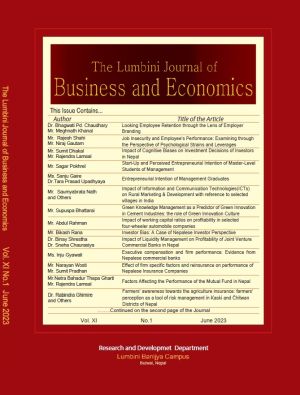The Need of Cognitive Behavioural Therapy (CBT) for Capital Market Investors of Northern India – An Empirical Analysis
DOI:
https://doi.org/10.3126/ljbe.v11i1.54330Keywords:
cognitive disorders, cognitive behavioural therapy, capital market investment, behavioural financeAbstract
The sudden and rapid growth of Indian capital markets has not only attracted global attention but has also propelled Indian people to invest in the markets, but there is a sizeable portion of such investors who have not actually been supposedly rational at making investment decisions and have ended up committing behavioural blunders with their capital market investment decisions which are giving them mental trauma and sleepless nights.
This study is the first of its kind on a global level where a total of 168 randomly selected capital market investors were asked to fill up a survey questionnaire aimed at testing the presence of five most prominent cognitive disorders (anxiety, panic attack, addiction, anger and eating disorder) among the capital market investors of India and the extent to which these disorders impact the stock investment decisions of Indian investors.
The results of the study show that cognitive disorders are not only closely associated with the investment decisions of Indian investors but also carry a significant impact on their market investment decisions. Moreover, there are considerable differences in opinions of investors across their socio-demography at 95% significance level (p<0.05) which gives a clear indication that Indian investors do need cognitive behavioural therapy to become more refined and sagacious at making capital market investments.
CBT has proven to be very helpful in treating a variety of mental illnesses in the past. Therefore, owing to the presence of cognitive disordersamongcapital market investors of India CBT can be of great help in developing an understanding of capital markets among investors by making them mindful of the unfavorable and frequently unreasonable considerations which adversely affect their sentiments, temperaments and subsequent market earnings.




